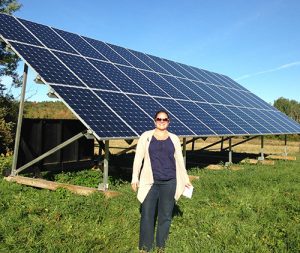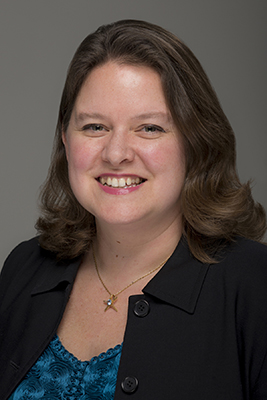Sharon Klein
Website: https://umaine.edu/soe/klein/
Research Interests:
- Technical, economic, environmental and social tradeoffs inherent in the production, distribution, and use of sustainable energy options
- Grassroots community renewable energy and energy efficiency
- Engineering-economic analysis
- Environmental life cycle assessment
- Social benefit-cost analysis
- Multi-criteria decision analysis
- Tradeoffs associated with multiple environmental issues: water, waste, pollution, climate change, ecosystems, biodiversity
Research Projects:
- Addressing Energy Justice Through Community Energy (FY21)
- Evaluating Success in Group Decision-Making Processes for River Systems (WRRI)
- Future of Dams (NEST)
- Community-Based Sustainable Energy Solutions
Resources:
- Let the Sun Shine In: Developing Tools for Community Solar in Maine (Mitchell Center feature story, March 2021)
- Sharon Klein featured on Maine Science podcast (Mitchell Center News, Oct. 2020)
- Sharon Klein named 2019 recipient of the Donald Harward Faculty Award for Service-Learning Excellence Mitchell Center News, May 2019)
- Science and Service, (UMaine Today 2017
- Warming Mainers, One Window at a Time (Solutions Newsletter 2017)
- Sun for All, All for Sun (Mitchell Center News, May 2016)
- UMaine Researchers Create U.S. Community Renewable Energy Website (Mitchell Center News, (June 2017)
- Community Solar: Harnessing the Power of the People (Mitchell Center Talk, Nov. 2015)
Degrees:
Ph.D., Engineering & Public Policy, Carnegie Mellon University
M.S., Engineering and Public Policy, Carnegie Mellon University
B.S., Environmental Science, University of Massachusetts, Amherst
Profile:

After receiving her B.S. in Environmental Science, Sharon volunteered for one term of service with the Americorps National Civilian Community Corps. She was stationed in Charleston, South Carolina and traveled with a team of thirteen people to seven states in the Southeast region of the Unites States doing service projects in the areas of education, the environment, and unmet human needs. She then worked for nearly two years as an environmental technician in San Diego, California, helping to remediate soil and groundwater contamination from leaking underground gasoline and diesel storage tanks. Subsequently, Sharon worked for three years as a middle school science teacher in San Diego and earned a California Teaching Credential in Chemistry from National University. She then taught International Baccalaureate Environmental Systems to high school students in Quito, Ecuador for two years before beginning graduate studies at Carnegie Mellon University in Pittsburgh, PA. She has been an Assistant Professor in the School of Economics since 2011, and was recently promoted to Associate Professor in 2018.
Sharon’s research is interdisciplinary in nature and centers on the technical, economic, environmental and social tradeoffs inherent in the production, distribution, and use of energy. She uses engineering-economic analysis, environmental life cycle assessment, social benefit-cost analysis, and multi-criteria decision analysis to assess tradeoffs in energy decision-making. She is interested in all energy options that have the potential to lead to a more sustainable energy future. Her particular expertise is in concentrated solar power, molten salt thermal energy storage, distributed solar thermal and photovoltaics (PV), drop-in cellulosic biofuels from woody biomass, hydropower, and community-based energy initiatives (especially solar and energy efficiency – window inserts). Her research team created a database of U.S. community-based renewable energy projects.
Selected Publications:
Note: I changed my last name to Klein in January 2013
*denotes student co-author
Alex, A., Kizha, A.R., George, A., Bick, S., Wang, J., Klein, S., Louis, L., Ling, L., Perera, P., Manohar, A. et al., “Carbon footprint of the predominant mechanized timber harvesting methods in the Northeastern US,” Cleaner and Circular Bioeconomy, vol. 9, p. 100097, Dec. 2024, doi: 10.1016/j.clcb.2024.100097.
Klein, S.J.W., Fox, E. (2022). Renewable and Sustainable Energy Reviews: A Review of Small Hydropower Performance and Cost. SSRN: 4034506
Stone, T., Klein, S.J.W., McKeague, K.K. (2021). Building Solar Capacity in Maine: The Greater Bangor Solarize Case Study. Maine Policy Review. 30(1), 31-44.
Klein, S.J.W., Hargreaves, A., Coffey, S. (2021). A financial benefit-cost analysis of different community solar approaches in the Northeastern US. Solar Energy. 213. 225-245. 10.1016/j.solener.2020.11.031.
Roy, S., Uchida, E., De Sousa, S., Blachy*, B., Fox*, E., Gardner, K., Klein, S.J.W., Zydlewski, J., 2018, Damming decisions: A multi-scale approach to balance trade-offs among dam infrastructure, river restoration, and cost. Proceedings of the National Academy of Sciences, vol. 115, no.47, pp. 12069-12074, www.pnas.org/cgi/doi/10.1073/pnas.1807437115.
Song*, C., Gardner, K., Klein, S.J.W., Pereira Souza, S., & Mo, W., 2018, Cradle-to-grave greenhouse gas emissions from dams in the United States of America. Renewable and Sustainable Energy Reviews, vol. 90, pp. 945-956.
Gunukula, S., Klein, S.J.W., Pendse, H., DeSisto, W., & Wheeler, M., 2018, Techno-economic analysis of thermal deoxygenation based biorefineries for the coproduction of fuels and chemicals. Applied Energy, vol. 214, pp. 16-23.
Klein, S.J.W, Noblet, C.L., 2017, Exploring Sustainable Energy Economics: Net Metering, Rate Designs and Consumer Behavior, Curr Sustainable Renewable Energy Rep, vol. 4, no. 2, pp. 23–32.
Whalley*, S., Klein, S.J.W., Benjamin, J., 2017, Economic analysis of woody biomass supply chain in Maine, Biomass & Bioenergy, vol. 96, pp. 38–49.
Klein, S.J.W., Coffey*, S., 2016, Building a sustainable energy future, one community at a time, Renewable and Sustainable Energy Reviews, vol. 60, pp. 867–880, doi: 10.1016/j.rser.2016.01.129.
Rubin, J., Neupane*, B., Whalley*, S., Klein, S., 2015. Woody Biomass Supply, Economics, and Biofuel Policy. Transportation Research Record: Journal of the Transportation Research Board 2502, 108–115. doi:10.3141/2502-13.
Klein, S.J.W., Whalley*, S., 2015, Comparing the sustainability of U.S. electricity options through multi-criteria decision analysis (MCDA), Energy Policy, 79, 127-149.

